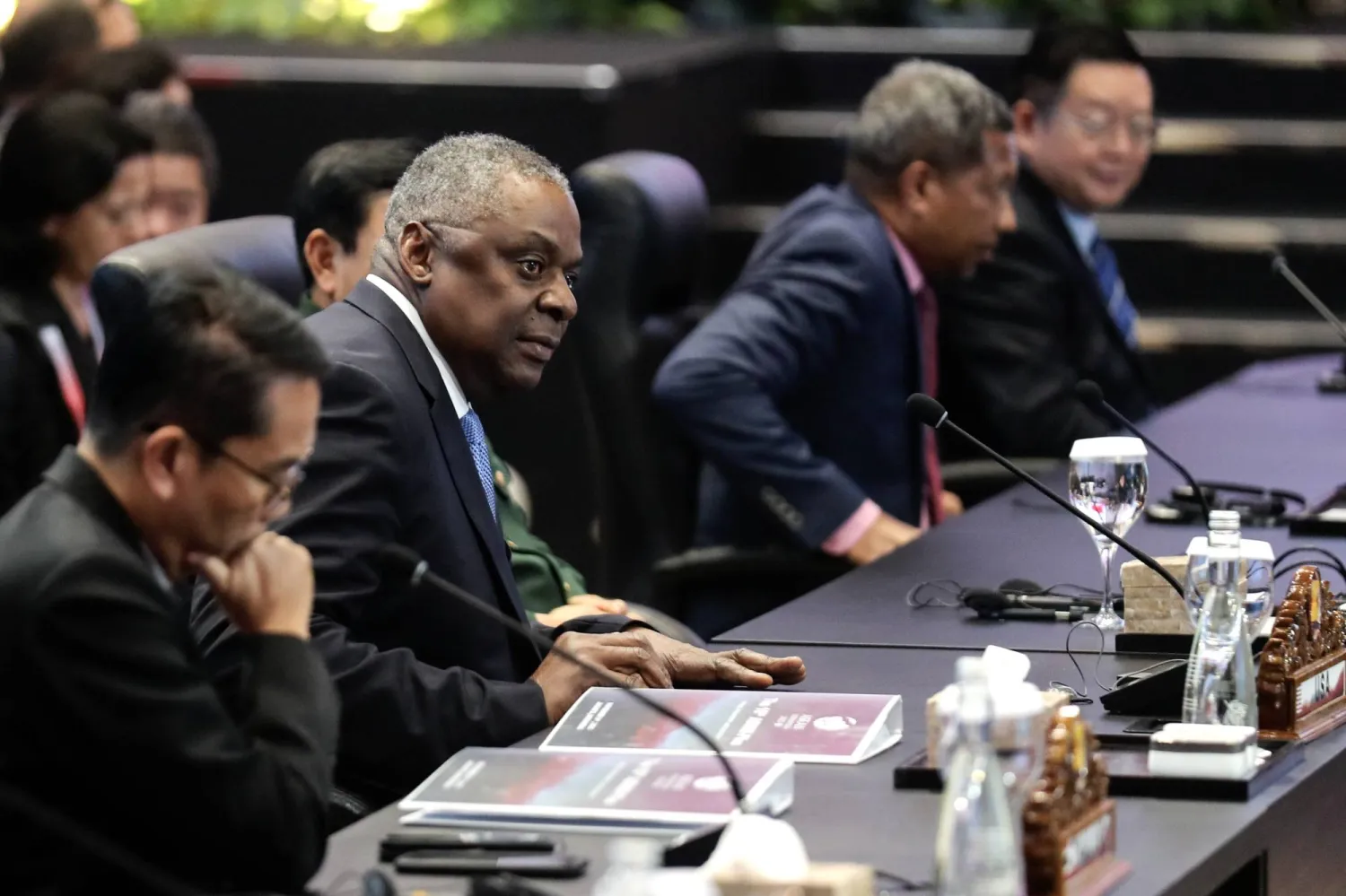US Defense Secretary Lloyd Austin made an unannounced visit to Kyiv on Monday in a high-profile push to keep money and weapons flowing to Ukraine even as US and international resources are stretched by the new global risks raised by the Israel-Hamas conflict.
Austin, who traveled to Kyiv by train from Poland, met with President Volodymyr Zelenskyy, Defense Minister Rustem Umerov and was scheduled to meet with Chief of Staff Gen. Valerii Zaluzhnyi.
In Kyiv, Austin said Ukraine's effort to defeat Russia's invasion “matters to the rest of the world" and that US support would continue “for the long haul."
Zelenskyy said Austin's visit was “a very important signal for Ukraine.”
“We count on your support,” Zelenskyy said, thanking Congress as well as the American people for their backing.
This is Austin’s second trip to Kyiv, but he’s making it under far different circumstances, as the world’s attention is drawn to the Middle East and signs of fatigue set in with the almost 21-month Russia-Ukraine war.
Austin's first visit occurred in April 2022, just two months after the start of the war. At the time, Ukraine was riding a wave of global rage at Moscow’s invasion, and Austin launched an international effort that now sees 50 countries meet monthly to coordinate on what weapons, training and other support could be pushed to Kyiv.
But the conflict in Gaza could pull attention and resources from the Ukraine fight. The US has worked feverishly since the Oct. 7 attacks by Hamas on Israel, and the weeks of devastating bombardment on Gaza by Israel that has followed, killing more than 10,000 civilians, to keep those attacks from turning into a regional war.
The US has already committed two carrier strike groups, scores of fighter jets and thousands of US personnel to the Middle East, and has had to shift its force posture and conduct airstrikes against Iranian-backed militant groups that are now hitting US bases in Iraq and Syria on a regular basis.
To date, Ukraine has received more than $44 billion from the US and more than $35 billion from other allies in weapons, ranging from millions of bullets to air defense systems, advanced European and US battle tanks and, finally, pledges for F-16 fighter jets.
But Ukraine still needs more, and after almost 20 months of shipping arms to Ukraine, cracks are beginning to show. Some European countries such as Poland have scaled back support, noting their need to maintain adequate fighting ability to defend themselves.
Ukrainian officials have strongly pushed back on suggestions they are in a stalemate with Russia after a long-awaited counteroffensive over the summer did not radically change the battle lines on the ground.
In a visit to Washington last week, Andriy Yermak, head of the president’s office, provided no details but confirmed that Ukrainian forces had finally pushed through to the east bank of the Dnieper River, which has essentially served as the immovable front line between Ukrainian and Russian forces for months.
However, as winter sets in it will become more difficult for either side to make large gains due to ground conditions. That could further work against Ukraine if US lawmakers perceive there’s time to wait before more funds are needed. Ukraine and the US expect that this winter Russia will go after Ukraine's infrastructure again, like the power grid, making air defenses critical.
Fred Kagan, a senior resident scholar at the American Enterprise Institute, said it would be a mistake to think there is time to wait.
“If we stop providing aid to Ukraine, it’s not that the stalemate continues. The aid is actually essential to preventing the Russians from beginning to maneuver again in ways that can allow them to defeat Ukraine,” Kagan said. “So the cost of cutting off aid is that Russia wins and Ukraine loses and NATO loses.”
Further complicating the support is that the Pentagon has only a dwindling amount of money left in this year’s budget to keep sending weapons to Ukraine, and Congress is months late on getting a new budget passed and has not taken up a supplemental spending package that would include Ukraine aid.
Since the war began in February 2022, the US has provided more than $44.2 billion in weapons to Ukraine, but the funding is nearly gone. The Pentagon can send about $5 billion more in weapons and equipment from its own stocks. But it only has about $1 billion in funding to replace those stocks. As a result, recent announcements of weapons support have been of much smaller dollar amounts than in months past.
“You have seen smaller packages, because we need to parse these out,” Pentagon deputy press secretary Sabrina Singh said Thursday. “Because we don’t know when Congress is going to pass our supplemental package.”
Officials have been urging Congress to provide additional money, but a growing number of Senate Republicans have opposed additional Ukraine aid without securing support for other unrelated provisions, such as stricter immigration laws and additional funding for border control. A stopgap spending bill passed last week to avoid a government shutdown during the holidays did not include any money for Ukraine.









